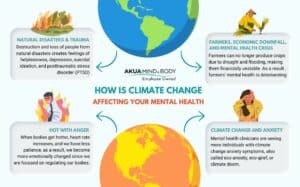Each summer feels hotter than the last, and it seems people are becoming irritable with the heat. Do you feel irritated, angry, or depressed in hot weather? If so, you are not alone. According to studies, Earth is heating up, and it doesn’t seem to be stopping anytime soon. Worldwide, 2016 was the warmest year on record, 2020 was the second-warmest, and 2012–2021 was the warmest decade on record since thermometer-based observations began. Concentrations of heat-trapping greenhouse gasses are increasing in the Earth’s atmosphere, and as a result, average temperatures at the Earth’s surface are increasing and are expected to continue rising.
The physical health impacts of climate change are apparent everywhere. Extreme heat waves resulting in heart stroke and death, floods resulting in water-borne illnesses, wildfires, and hurricanes causing pollutants to result in respiratory diseases are some common physical health impacts of rising temperatures. However, physical health impacts associated with climate change are not the only consequences on our health. Rising temperatures are affecting our mental health as well.
Natural disasters and trauma
With climate change comes an increased incidence of wildfires, hurricanes, and floods, which can result in the loss of property and life. The destruction, loss, and displacement of people from these natural disasters can create feelings of helplessness, depression, suicidal ideation, and posttraumatic stress disorder (PTSD). Losing your livelihood from a natural disaster and being left with nothing is traumatizing. People at the epicenter of these events suffer the most. Sixty-seven percent of individuals with direct exposure to the California Camp Fire of 2018 said they experienced trauma similar to PTSD, compared with 14 percent of those indirectly exposed.
Hot with anger
As temperatures continue to rise, violence, suicide attempts, and ER visits due to mental health crises also increase. We become more angry and emotionally driven when temperatures increase because we shift from a state of comfort to a state of discomfort. When we become uncomfortable, our ability to manage our emotions and stress levels diminish. During heatwaves, our nervous systems and body release adrenaline and other “fight or flight” hormones to help us manage to live in higher temperatures as our bodies see these rising temps as a threat. When our bodies get hotter, our heart rate increases, and we have less patience and, as a result, become more emotionally charged because we are focused on regulating our bodies. Our coping mechanisms go to the wayside, and we lash out. Hot weather can also result in trouble sleeping, which makes us tired and more irritable throughout the day.
A 2021 meta-analysis and review of research published in the journal Environment International found a correlation between higher average temperatures and poor mental health, suggesting a slight (2.2%) increase in mental health–related mortality per every 1.8 degrees Fahrenheit rise in temperature. The authors of the paper note studies have found that mental health–related hospital admissions and emergency department visits for conditions like anxiety, depression, schizophrenia, and others increased with high temperatures.

Farmers, economic downfall, and mental health crisis
In general, individuals are anxious about the climate crisis. Increasing temperatures contribute to natural disasters, which cause loss of life and property and are financially crippling people. Farmers who rely on water, good soil, and moderate temperatures struggle with their mental health as the climate crisis worsens. They can no longer produce crops due to drought and flooding, making them financially unstable. As a result of this economic downturn, farmers’ mental health is deteriorating with rising rates of depression, anxiety, and suicide.
A 2022 study published by the Giannini Foundation of Agricultural Economics at the University of California found that extreme heat is “positively associated” with farmer suicide. A 2021 study by a Colorado-based suicide prevention group found that when drought conditions increased in the state, so did the suicide rate among farmers. For instance, the farmer crisis hotline run by Farm Aid has seen a significant increase in calls from farmers during natural disasters linked to climate change.
Climate change and anxiety
Mental health clinicians are seeing more individuals with climate change anxiety symptoms, also called eco-anxiety, eco-grief, or climate doom. This is described as excessive worry about the future concerning climate change. That can manifest as intrusive thoughts or feelings of distress about future disasters or the long-term future of our existence as humans. Maybe you are terrified of losing your house in a wildfire or getting caught in a hurricane.
As the Earth continues to heat up, these worries are realistic. Still, the anxiety can often be out of proportion and uncontrolled to the point that individuals need treatment in the form of therapy and medications. Individuals already struggling with anxiety disorders are more prone to eco-anxiety, worsening their baseline anxiety.
Looking forward
In 2022, a new WHO policy brief was launched at the Stockholm+50 conference to address mental health and climate change. “The new WHO policy brief recommends five important approaches for governments to address the mental health impacts of climate change:
- integrate climate considerations with mental health programs;
- integrate mental health support with climate action;
- build upon global commitments; develop community-based approaches to reduce vulnerabilities; and close the large funding gap for mental health and psychosocial support”.
If you notice that your mental health worsens during the summer or heatwaves, know that you are not alone. The relationship between climate change and mental health is serious, and there are steps you can take to manage your mental health as global warming continues to worsen. Self-care routines, therapy, medications, and mental health support groups are some options if you feel your mental health is taking a toll on your daily life.




